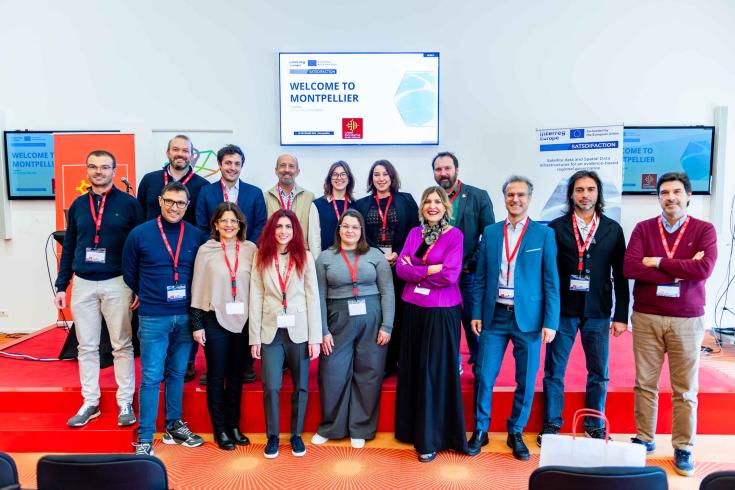SATSDIFACTION organizes its 4th LDD in Montpellier

The 4th Learning Deep Dive (LDD) organized by the SATSDIFACTION project took place from 10-12 December 2024, hosted by project partner Occitanie Region in Montpellier.
This event brought together project partners, experts, policymakers, and local stakeholders to exchange knowledge on using spatial data infrastructures to tackle climate change and improve territorial policies.
On the first day, hosted at Espace Capdeville, the event commenced with opening remarks by Marie-Thérèse Mercier, Regional Councillor, who emphasized Occitanie’s leadership in spatial technologies. Mirko Mazzarolo from the Veneto Region, the project’s coordinator, and Margarita Chrysaki, NEREUS Communication, Policy, and Project Officer, provided an overview of the initiative, highlighting its importance in strengthening regional ecosystems and its impact at the European level.
The following session focused on regional strategies for integrating spatial data into climate policies, aligning these strategies with the broader European framework of the Green Deal. Key speakers included Marie-Laure Pouilles, Head of Research Department, Direction of Innovation, Industry, Research and Higher Education at the Occitanie Region; Karine Jacquelin, Data and Territory Department Manager, Information and Digital Department at the Occitanie Region; Maud Murgue, Mission Leader for Green Deal and Climate Change at the Occitanie Region; and Luc Bidard, Head of Green Deal and Climate Change Mission at the Occitanie Region.
The second panel discussion of the day explored the dynamics of the space industry in Occitanie, showcasing collaborative approaches to foster climate resilience and innovation. Speakers included Sylvie Teysseyre, Head of Data Economy in Space for Aerospace Valley; Bastien Nguyen Duy-Bardakji, Co-founder and Managing Director at La TeleScop; Pierre Maurel, Director at UMR TETIS - INRAE; François Jocteur Monrozier, Deputy Director for Missions, Earth Observation Data and Downstream Applications at CNES; Frédéric Huynh, Director at Data Terra Research Infrastructure; Arnaud Ceyte, Head of Satellite Unit at CEREMA; Anne Fromage-Mariette, Director at OPenIG; Alexandre Richard, Coastal Studies Officer at the Occitanie Region; Alexian Ajas, EID Méditerranée; and Johanna Bonnefoy, PEP-BiOccIA Project Coordinator.
The second day delved into practical applications, beginning with a morning field visit to the beach of Le Petit Travers to observe coastal erosion and learn about Occitanie's strategies to mitigate and adapt to this phenomenon. In the afternoon, hosted at the Villeneuve-lès-Maguelone complex, workshops were held on using satellite imagery to monitor shoreline retreat. Furthermore, hands-on sessions with the QField app for real-time field data management took place, with project partners contributing directly to the monitoring efforts. The day concluded with a networking session followed by a social dinner, allowing participants to enjoy local French delicacies while exchanging ideas and building connections.
The final day, hosted at the Maison de la Télédétection, centered on the use of satellite data in agriculture and water resource management. Presentations were given by Isabelle Biagiotti from DataTerra, Marie Demarchi from CIRAD, Emeric Lavergne from CNES, and Ruth Lavie from OpenIG, showcasing innovative applications of spatial data in these critical sectors.
The 4th Learning Deep Dive underscored the transformative potential of spatial data infrastructures in addressing environmental challenges. Participants engaged in fruitful exchanges, setting the stage for actionable strategies and collaborative projects. With these insights, the SATSDIFACTION project continues to foster innovation and resilience at the regional level.
